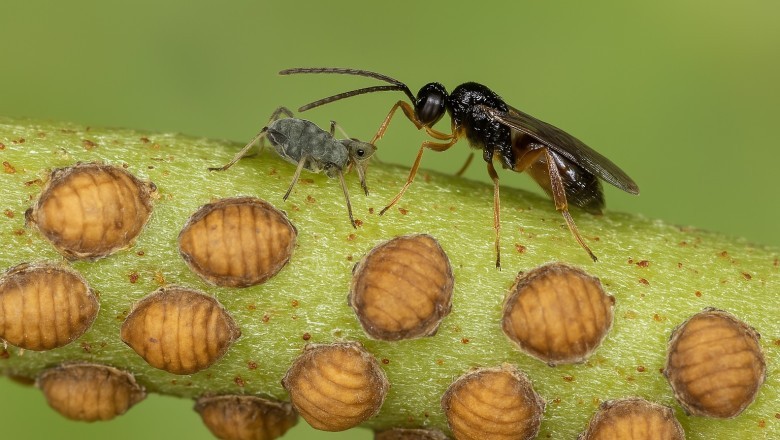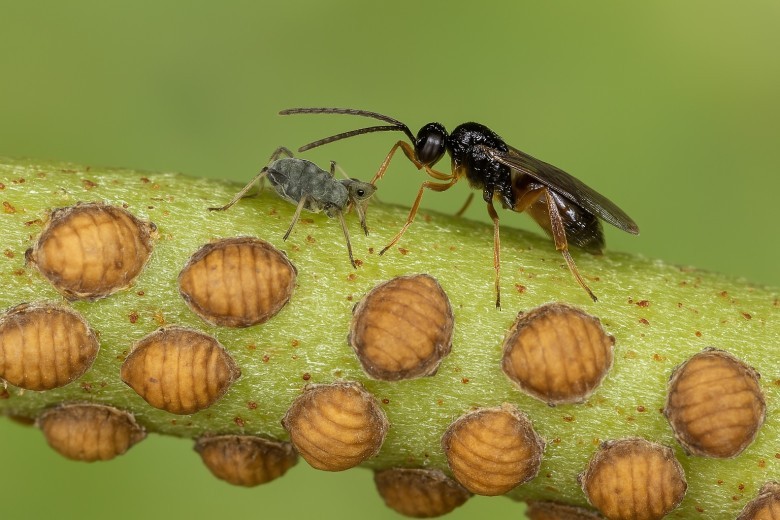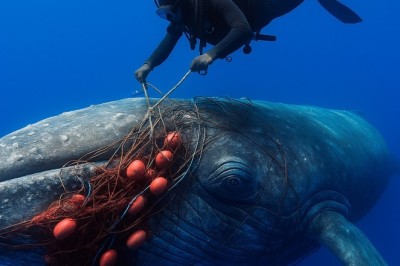
views
Asexual Wasps Could Revolutionize Chemical-Free Pest Control, Scientists Say
In a breakthrough that could reshape sustainable agriculture, researchers at the University of Stirling have uncovered surprising reproductive behavior in a tiny species of parasitoid wasp, Lysiphlebus fabarum. Long believed to reproduce solely through asexual means, these wasps have now been shown to engage in facultative sex—reproducing both with and without a mate. This discovery not only challenges long-standing assumptions in evolutionary biology but also opens new doors for environmentally friendly pest control strategies.

Dr. Rebecca Boulton, a lecturer in Biological and Environmental Sciences at Stirling, led the study that revealed this unexpected flexibility in reproduction. Her findings suggest that L. fabarum, which naturally targets aphids—a major agricultural pest—could be harnessed more effectively as a biocontrol agent. The implications are far-reaching, offering a potential alternative to chemical pesticides and contributing to the development of more resilient pest management systems.
The Wasp Behind the Discovery
Lysiphlebus fabarum is a minute parasitoid wasp, measuring just about 1mm in length. Despite its size, it plays a formidable role in nature’s pest control arsenal. Female wasps inject their eggs into aphids, sap-sucking insects that damage crops worldwide. The wasp larvae then develop inside the aphid, consuming it from within and ultimately killing the host. This gruesome but efficient process makes L. fabarum a natural enemy of aphids and a promising candidate for biological pest control.
Until recently, scientists believed that asexual females of this species could not reproduce sexually. However, Dr. Boulton’s research has overturned that assumption. Through a series of controlled experiments, she observed that asexual females were not only mating with males but also producing fertilized eggs. This phenomenon, known as facultative sex, allows the wasps to switch between cloning themselves and mixing their genes with those of a mate.
Evolutionary Implications
Facultative sex is a rare and intriguing reproductive strategy. Asexual reproduction is highly efficient, enabling rapid population growth without the need for a mate. However, it limits genetic diversity, which can hinder a species’ ability to adapt to changing environments. Sexual reproduction, on the other hand, promotes genetic variation and evolutionary resilience but comes with the cost of finding and competing for mates.
Dr. Boulton’s findings suggest that L. fabarum may have found a way to balance these trade-offs. “In an evolutionary sense, facultative sex seems like a perfect strategy,” she explained. “It combines the efficiency of asexual reproduction with the adaptive benefits of sexual reproduction.”
Yet, the study also revealed hidden costs. Asexual females that engaged in mating produced fewer offspring than those that remained asexual. This reduction in reproductive success could limit how frequently facultative sex occurs in nature, despite its evolutionary advantages.
The Experiment
To investigate the reproductive behavior of L. fabarum, Dr. Boulton reared the wasps in a Controlled Environment Facility at the University of Stirling. Initially, she planned to compare the parasitism rates of sexual and asexual wasps. But early in the experiment, she noticed unexpected mating behavior among the asexual females. This prompted a shift in focus.
Over six weeks, she conducted a detailed study involving around 300 wasps. Each was placed in a petri dish with a colony of aphids, and researchers recorded how many aphids were parasitized. The experiment spanned two generations of wasps, allowing for a comprehensive analysis of reproductive success and pest control efficiency.
DNA testing confirmed that the offspring of mated asexual females contained genetic material from male parents, proving that sexual reproduction had occurred. This was a pivotal moment in the study, providing concrete evidence that facultative sex was not only possible but actively taking place.
Agricultural Applications
The discovery has significant implications for agriculture. Many species of parasitoid wasps are already mass-reared and released as natural alternatives to chemical pesticides. However, L. fabarum has not yet been widely used in commercial pest control programs, despite its global presence and ecological importance.
One reason for this is the challenge of producing wasps that are well-adapted to specific local conditions. Asexual reproduction allows for the rapid production of large numbers of wasps, but it limits genetic diversity. This can make commercially reared wasps less effective in diverse or changing environments.
Dr. Boulton’s research suggests that incorporating sexual reproduction into rearing protocols could enhance genetic diversity and adaptability. “My findings could be used to develop new biocontrol agents that are better suited to different regions,” she said. “Harnessing their natural reproductive behavior could make them more resilient and effective.”
A Step Toward Sustainable Pest Control
The potential benefits of this research extend beyond agriculture. As the global community seeks to reduce reliance on chemical pesticides, biological control methods are gaining traction. Parasitoid wasps like L. fabarum offer an environmentally friendly alternative that aligns with efforts to promote biodiversity and sustainable farming practices.
Professor Anne Ferguson-Smith, Executive Chair of the Biotechnology and Biological Sciences Research Council (BBSRC), praised the study as an example of curiosity-driven research with real-world relevance. “Dr. Boulton’s work opens up promising avenues for more sustainable pest control,” she said. “It strengthens the UK’s research base and drives innovation that benefits the environment, food systems, and society at large.”
The study, titled Is facultative sex the best of both worlds in the parasitoid wasp Lysiphlebus fabarum?, was published in the journal Royal Society Open Science. It was funded through a BBSRC Discovery Fellowship, highlighting the importance of supporting early-career researchers in exploring fundamental questions in bioscience.












Comments
0 comment